How to Improve and Secure Interventional Procedures for Heart Diseases? Opinion of the Chief Specialist of the Ministry of Health on Pediatric Cardiac Surgery
He also serves as the Chief Freelance Specialist of the Ministry of Health in pediatric cardiac surgery.
Text of the speech:
“Every year, the number of cases of congenital heart defects (CHD) in children increases in our country, which becomes a serious problem for the healthcare system. Research shows that due to insufficient and delayed medical assistance, as well as late diagnosis, the level of child mortality is rising. In the absence of urgent surgical assistance or intensive therapy, up to 50% of newborns and young children with CHD may die within the first year of life. Those who survive this critical stage face progressive heart failure and other complications, which can lead to death at a later age or severe disability, which, in turn, causes significant harm to the economic development of the country.
Today, interventional cardiology is rapidly advancing, including minimally invasive and percutaneous procedures for both adults and children. Interventions concerning congenital heart defects are performed both in infancy and intrauterinely during pregnancy.
Firstly, alongside state institutions where percutaneous interventions for cardiovascular diseases are carried out, several private clinics have emerged offering similar services, including cardiac surgical assistance, in Bishkek, Osh, and Manas. The number of such centers is expected to grow, both public and private.
Therefore, to comply with current international standards in cardiac surgical assistance, optimal use of available resources, and ensure the safety of procedures, as well as prevent complications that may lead to fatalities, it is extremely important to develop and approve the “Regulations on Cardiac Centers,” which will engage in interventional cardiac surgery and open-heart surgeries. This will help significantly reduce cases of unjustified stenting in coronary artery disease in adults when there are no objective indications for such procedures, for example, with a 70% vessel occlusion without signs of acute ischemic myocardial damage, or with lesions of the left anterior descending coronary artery with a high risk of restenosis, which may complicate future coronary artery bypass grafting (in such cases, coronary artery bypass grafting would be more preferable).
This regulation should outline unified standards for the operation and equipment of such centers, regardless of their ownership structure. All cardiac centers and medical institutions where cardiology centers operate must be registered with the Ministry of Health.
Secondly, the state and government, under the leadership of the President, are actively addressing health protection issues, allocating significant financial resources for the healthcare sector. It is important to manage these resources rationally. In particular, more than 10 echocardiographs and over 5 angiographs have been purchased for the regions at a cost of more than 350 million soms. Funding for the angiographs has already been transferred, and suppliers are ready to install the expensive equipment; however, the facilities and qualified personnel to work with it have not yet been prepared. Thus, these funds could be used this year for extremely important needs, such as pediatric cardiology, oncology, and other areas.
Furthermore, it is necessary to create a cardiac surgery department in Osh to perform surgeries on children with congenital heart defects and implement operations for children with complex congenital heart defects, especially those aged 1 to 3 years, at the Southern Regional Center for Cardiovascular Surgery in Manas.
I believe that detailed analysis and planning will significantly improve the quality of high-tech medical assistance to the population, standardize it, and ensure compliance with modern international standards.”
Read also:
Charitable Collaboration Expands Opportunities for Cardiac Surgery in Kyrgyzstan
In one of the private medical institutions in Kyrgyzstan, a program for free surgeries for patients...
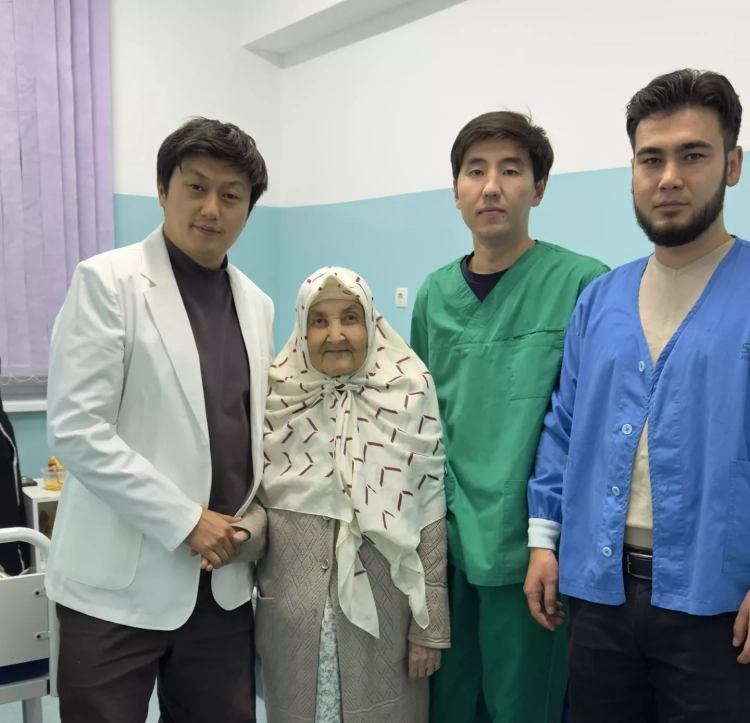
A Unique Operation for Implanting an Aortic Heart Valve in a 73-Year-Old Patient Conducted in Kyrgyzstan
In early October 2025, an innovative transcatheter aortic valve implantation (TAVI) surgery was...
A Pediatric Cardiologist Discusses the Problems and Treatment Opportunities for Heart Defects in Kyrgyzstan. Interview
The reduction of infant mortality in Kyrgyzstan is observed; however, this problem still remains...
API error: HTTP 429
API error: HTTP 429...
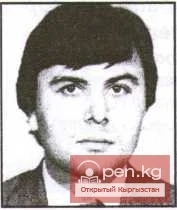
Murad Khasanovich Dadabaev (1957)
Dadaev Murat Khasanovich (1957), Doctor of Medical Sciences (1986), Laureate of the State Prize of...
What is Needed for the Development of High-Tech Medical Care in Kyrgyzstan? Opinion of Professor I. Pershukov
Professor and Doctor of Medical Sciences, as well as Doctor of Philosophy (PhD) Igor Pershukov...
Scientists have found a molecule that helps the heart recover after a heart attack
A group of scientists from the Temple University School of Medicine (USA) has identified a new...
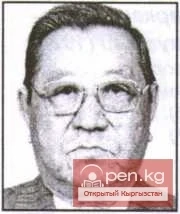
Baizakov Usenbek (1930)
Bayzakov Usenbek (1930), Doctor of Medical Sciences (1988), Professor (1989). Kyrgyz. Born in the...
In Kyrgyzstan, about 20 thousand people die from heart diseases every year
According to information voiced on the air of "Birinchi Radio" by the head of the...
Professor: Mortality from heart diseases in Kyrgyzstan is several times higher than official data
Professor Talant Sooronbaev, head of the National Center for Cardiology and Therapy named after...
In Kyrgyzstan, a national program for the implementation of prenatal screening has been developed
In Kyrgyzstan, a national program called "Ümüt" has been initiated, aimed at implementing...
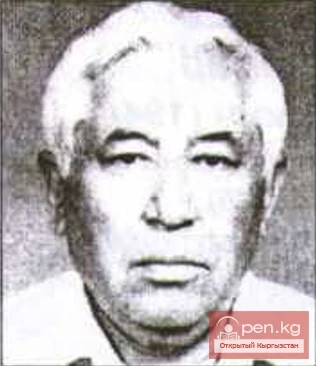
Maralov Aspandiyar Nesipchoroevich
Maralov Aspandiyar Nesipchoroievich (1938), Doctor of Medical Sciences (1981) Kazakh. Born in the...
Ak-Talinskaya Hospital Received Medical Equipment for Ophthalmology, Cardiology, and Assistance to Premature Infants
In the Ak-Talinskaya Hospital of the Naryn region, the most necessary medical devices have been...
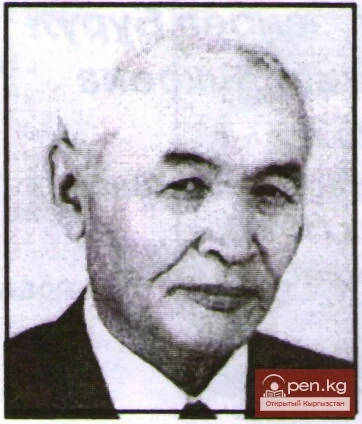
Joshibaev Seithan (1939)
Dzhoshibaev Seikhan (1939), Doctor of Medical Sciences (1981), Professor (1994), Corresponding...
How Should the Cardiological Care System Be Structured? A Commentary by Professor Talantbek Batyraliev
Professor Talantbek Batyraliev, Doctor of Medical Sciences and a full member of the American...
Due to smog, the number of children with asthma, allergies, and other diseases is increasing, - doctor
In Kyrgyzstan, respiratory diseases rank among the leading positions among children's...
In the Perinatal Center, 118 twins were born in 10 months
According to the Ministry of Health, the City Perinatal Center registered 9,084 births and 9,128...
Can We Cope with Arterial Hypertension? Kyrgyzstan–2025: An Inside Perspective
Doctor of Medical Sciences, Professor Igor Pershukov expressed his opinion on the possibility of...

How Many Steps Are Needed for a Healthy Heart? Results of a New Study
A study has shown that older women who walked at least 4,000 steps one to two days a week had a...
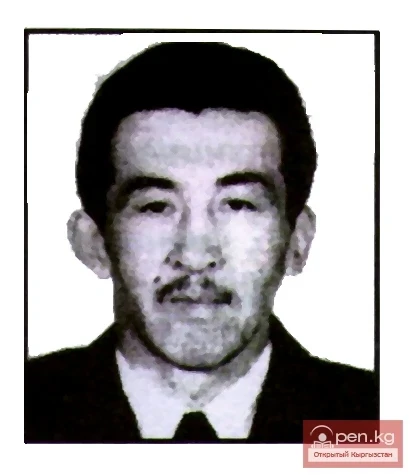
Abdramанов Kaldarbek Alisherovich — Doctor of Medical Sciences
Abdramanov Kaldarbek Alisherovich (1955), Doctor of Medical Sciences (1996)...
In Kyrgyzstan, there is an increase in the number of children with diabetes
According to the press center of the Ministry of Health of Kyrgyzstan, in 2024, more than 1,200...
"2x2=4 for Myocardial Infarction". Algorithm for Patients and Medical Services in Acute Myocardial Infarction
Professor Igor Pershukov, who heads the Department of Hospital Therapy with a course in...
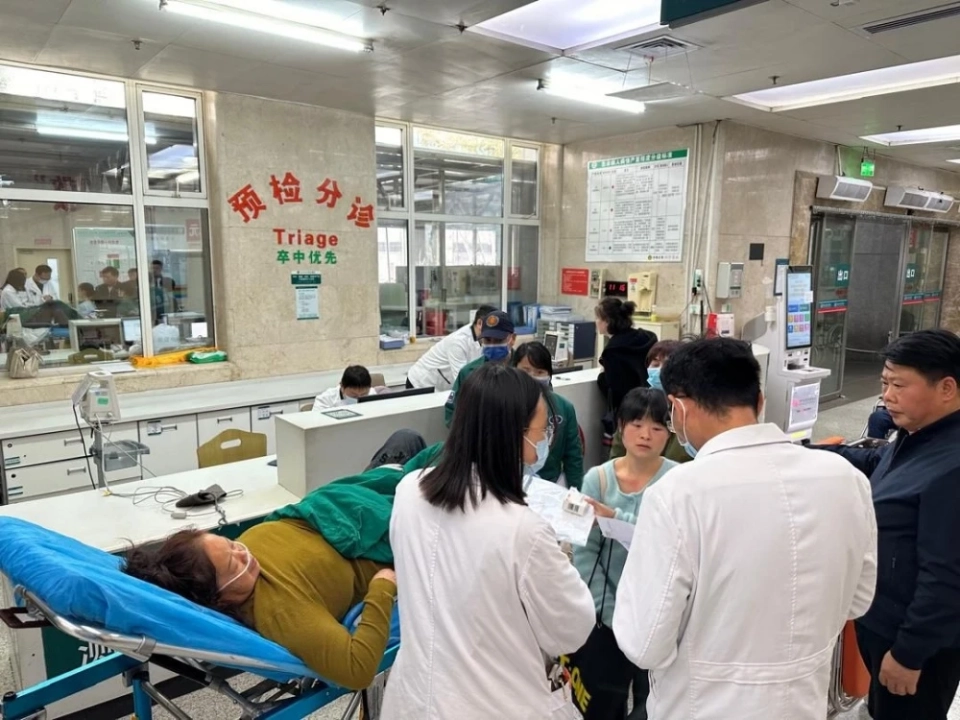
Doctors of Kyrgyzstan are undergoing a two-week internship at the Sanya clinic
As part of international cooperation in the field of healthcare, a group of doctors from the...
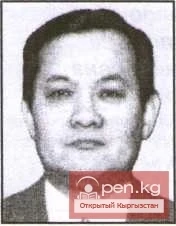
Ernest Dzhishambaev Jumakadyrovich (1958)
Dzhishambaev Ernest Dzhumakadyrovich (1958), Doctor of Medical Sciences (2001). Kyrgyz. Born in...
Distortions in Oncology Care for the Population of Kyrgyzstan. Commentary by Professor T. Batyraliev
Professor Talantbek Batyraliev, who previously held the position of Minister of Health, shared his...
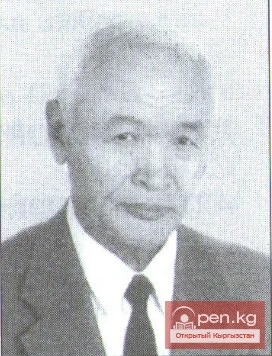
Joshibaev Seikhan Joshibaevich
Joshibaev Seithan Joshibaevich Doctor of Medical Sciences, Professor, Corresponding Member of the...
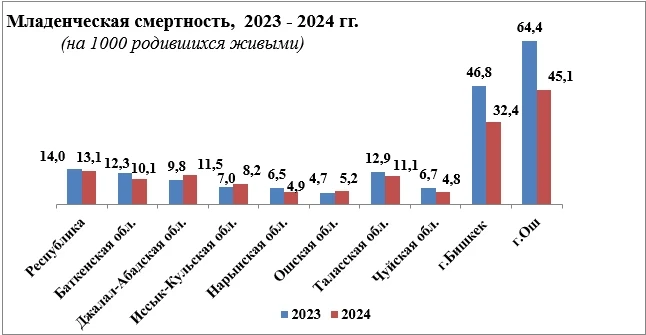
Infant mortality in Kyrgyzstan remains at a high level
Despite a slight decrease, the infant mortality rate in Kyrgyzstan remains high. This is noted in...
Every fourth adult in the Kyrgyz Republic suffers from obesity, and the risk is increasing among children.
Kyrgyzstan has found itself among countries with a high risk of obesity and related diseases,...
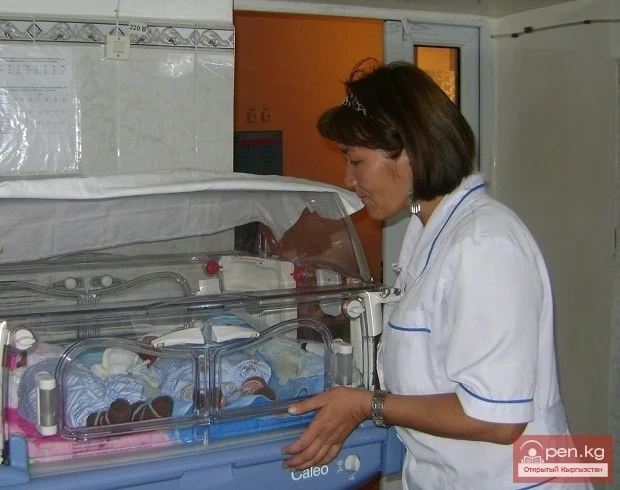
In Kyrgyzstan, efforts to protect motherhood and childhood are being supported.
In the photo: Kyrgyz nurse Zamira Omorova cares for newborns in a maternity hospital in Kara-Balta...
Against the backdrop of rising morbidity from ARVI and influenza, the head of the Ministry of Health familiarized himself with the situation in hospitals in Bishkek.
On November 21, the press service of the Ministry of Health reported that Erkin Checheybaev, the...
The number of children poisoned by shawarma at a private school has increased to 63
According to the Ministry of Health, the total number of children poisoned by shawarma at a private...
In Kyrgyzstan, more than 12,000 premature babies are born each year
According to the Ministry of Health, between 10,000 and 12,000 newborns are born prematurely in...
Kyrgyzstanis Consume Too Much Salt. Doctor Warns of Risks
According to the statement by Myskal Duyshenalieva, head of the hypertension department at the...

"Fair of Products by Elderly People 'From Heart to Heart'"
Resource Center for the Elderly On October 1, 2019, a Nordic walking event with the participation...
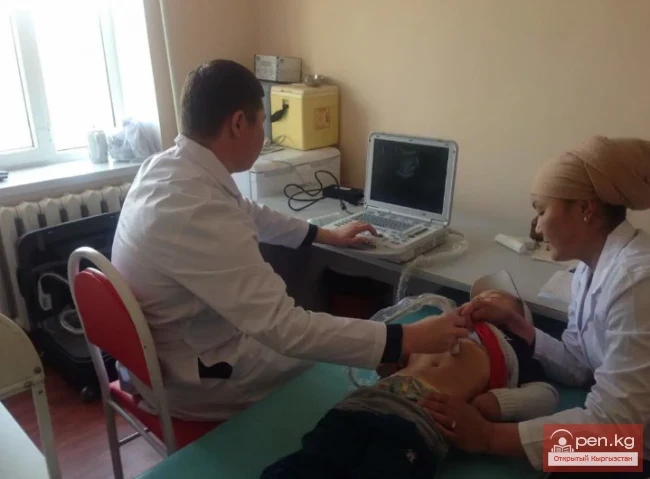
Osh Central Hospital
Healthcare in Osh Great attention was paid to the development of healthcare in Osh. Before the...
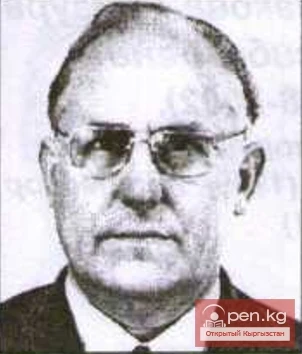
Kononov Viktor Sergeyevich
Kononov Viktor Sergeevich (1922), Doctor of Medical Sciences (1970), Professor (1972) Russian....
Increase in excise taxes on tobacco, alcohol, and sugary drinks. Opinion of the Ministry of Health
The Ministry of Health of Kyrgyzstan has expressed its position regarding the increase in excise...
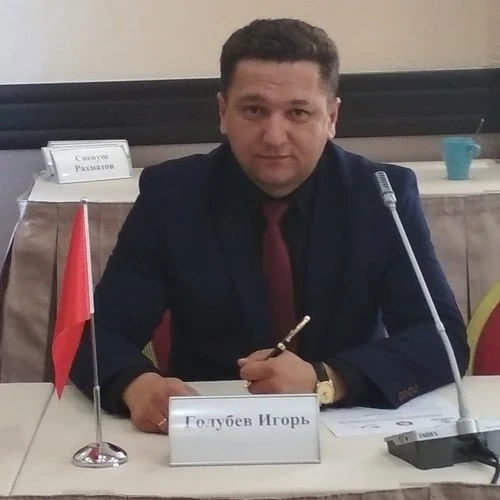
Igor Golubev: Kyrgyzstan Should Have Its Own Navy
At the KyrgyzTransLogistic 2025 exhibition, held on the international stage, Igor Golubev, who...
The Main Internal Affairs Directorate of Bishkek is investigating the case of a four-year-old girl’s death after surgery.
An investigation has been launched in Bishkek in connection with the death of a four-year-old girl...
Aylin with Down syndrome and a heart defect needs surgery abroad. She needs help.
From birth, Aylin had Down syndrome, which immediately raised doctors' suspicions of a...
Study: Some viruses may significantly increase the risk of cardiovascular diseases
According to a study conducted by the American Heart Association, certain viral infections, such as...
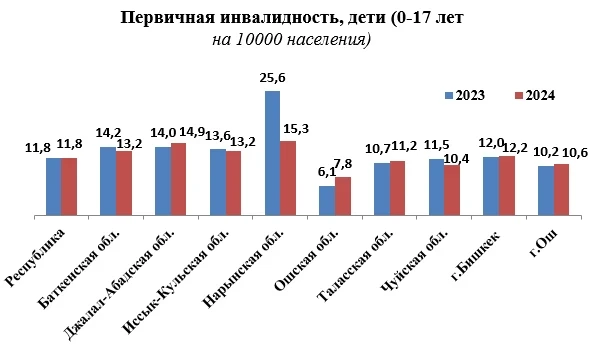
The rate of primary disability among adults decreased in Kyrgyzstan in 2024
According to the Center for Electronic Health, last year 7,444 adults with disabilities were...
What are the main causes of infant mortality in the Naryn region?
In the Naryn region, from January to September 2025, there were 2,617 registered newborns, which is...

Lead in children's blood, liquid mercury in hands at the celebration: has the attitude towards health become more careless?
Threats to the lives of Kyrgyz citizens are becoming increasingly relevant As a result of a study...